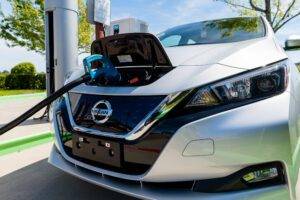Nissan pledges to go fully electric in Europe by 2030


Nissan has pledged to go fully electric in Europe by 2030, outpacing the watered-down ambitions announced by Rishi Sunak of the British government.
“There is no turning back now,” Makoto Uchida, chief executive of the Japanese car-maker said. “Nissan will make the switch to full electric by 2030 in Europe — we believe it is the right thing to do for our business, our customers and for the planet.”
The commitment to the 2030 deadline comes less than a week after Rishi Sunak delayed a proposed ban on the sale of new petrol and diesel cars by five years to 2035. The U-turn sparked an industry backlash and warnings that uncertainty over policy was putting future investment at risk.
Earlier this year Nissan raised its targets for EV models. It is playing catch-up in a segment dominated by newcomers such as Tesla and has said it will launch 19 new EV models in Europe by 2030. Uchida said today that one of two new electric models Nissan has already confirmed for Europe will be manufactured at its Sunderland plant.
Nissan also previously said that by mid-2027 98 per cent of its sales in Europe would be either fully electric cars or hybrids.
The new goal of going fully electric by 2030 — announced at the launch of futuristic Concept 20-23 design in Paddington, London — brings it into line with its alliance partner Renault, which plans to make the Renault brand all electric by then.
The group, which has 7,000 UK employees, is investing £1 billion alongside Chinese-owned battery maker AESC to produce more electric vehicles in the UK.
Ford and Stellantis also plan to be fully electric in Europe by 2030. Volvo plans to sell only EVs globally by 2030.
Sunak announced the reversal of the 2030 ban in a speech last week alongside a series of other measures to row back on the government’s climate change commitments as he claimed that politicians had not been “honest with the public” about the cost of reaching net zero.
Ford said it showed a lack of commitment and ambition, pointing to the millions of pounds they had already pumped into their UK operation. Investments have also been made in Tata’s battery gigafactory in Somerset and the BMW plant at Cowley.
Lisa Brankin, chairwoman of Ford, said: “Our business needs three things from the UK government: ambition, commitment and consistency. A relaxation of 2030 would undermine all three.”
JLR, the UK’s second largest carmaker, welcomed the prime minister delay, however. It said it was pragmatic and brought the UK in line with other nations.
Read more:
Nissan pledges to go fully electric in Europe by 2030
